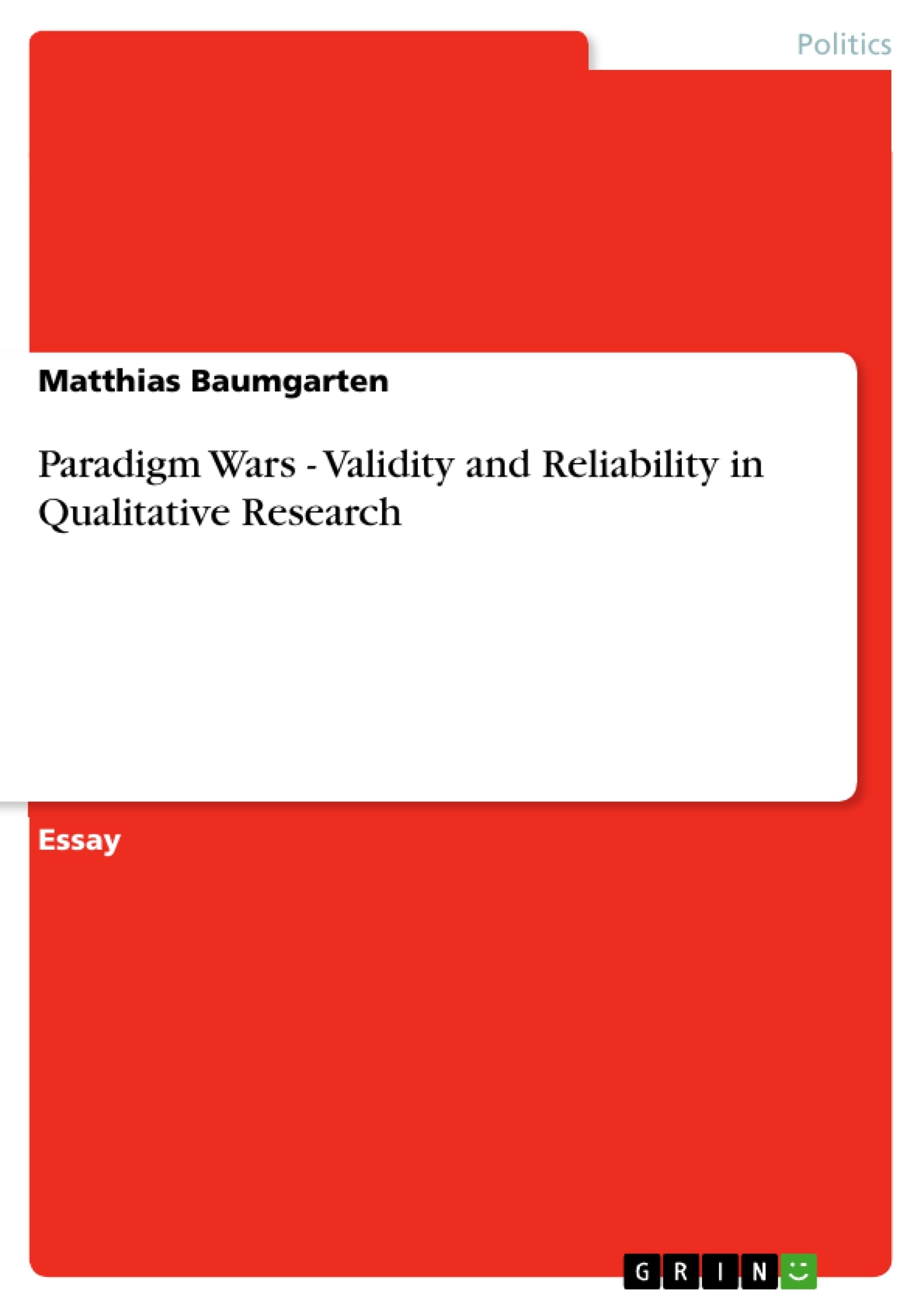Validity and reliability as quality indicators have an uneasy standing in qualitative research and are subject to numerous debates. Researchers from different paradigmatic backgrounds expressed a variety of views, the extremes ranging from a complete denial of the possibility of valid and reliable qualitative research on one hand to the rejection of validity and reliability as meaningful quality indicators on the other. The following essay acknowledges the diverging assumptions underlying the different paradigms associated with quantitative and qualitative research. However, it denies that validity and reliability are inherently connected to predetermined ontological or epistemological assumptions and argues for their general use as quality indicators. To clarify this claim, a selection of different paradigms and the
development of alternative quality indicators within them are highlighted. Since the usefulness of this multitude of indicators is questionable, reconciliation is attempted by consolidating them. The concepts of “core validity” and “core reliability”, which can be specified according to the researcher’s paradigm, are introduced for this task. These concepts underline the relevance and applicability of validity and reliability as quality indicators in qualitative research. Furthermore, qualitative research has developed strategies and methods, which enable the researcher to address negative influences on validity and reliability and achieve high degrees of both.
Table of Contents
- Abstract
- Introduction
- The quality conflict - indicators and paradigms
- Reconciliation - core validity and core reliability
- Challenges and solutions to validity and reliability in qualitative research
- Conclusion
Objectives and Key Themes
This essay examines the debate surrounding validity and reliability in qualitative research. It challenges the common perception that these quality indicators are inherently tied to positivist or quantitative assumptions. The essay argues that validity and reliability can be applied broadly as research quality indicators across different paradigms, including qualitative research. The main focus is on reconciling conflicting views on research quality within various paradigms, emphasizing the relevance and applicability of validity and reliability within a qualitative context.- The role of paradigms in shaping research quality standards
- The historical development of validity and reliability in quantitative research
- Alternative quality indicators proposed within qualitative research
- Reconciling differing perspectives on validity and reliability through "core validity" and "core reliability"
- Strategies and methods for addressing challenges to validity and reliability in qualitative research
Chapter Summaries
- Abstract: This chapter introduces the debate on validity and reliability in qualitative research, acknowledging the diverse viewpoints stemming from different paradigms. It argues for the general applicability of these indicators while acknowledging the need for paradigm-specific adaptations.
- Introduction: This chapter establishes the background for the debate, highlighting the different paradigms in scientific research, particularly the contrast between positivist and qualitative approaches. It addresses the critique of validity and reliability in qualitative research and asserts the relevance and applicability of these indicators across paradigms.
- The quality conflict - indicators and paradigms: This chapter explores the contrasting understanding of research quality between quantitative and qualitative approaches. It examines two frameworks for assessing scientific paradigms and highlights the emergence of reliability and validity as indicators within a largely positivist quantitative research environment. The chapter then explores how alternative quality standards have emerged within qualitative research, leading to claims of a lack of reliability and validity in qualitative findings.
- Reconciliation - core validity and core reliability: This chapter introduces the concepts of "core validity" and "core reliability" as a means to reconcile the differing views on research quality within various paradigms. It suggests that these concepts, adaptable to different theoretical frameworks, can accommodate a variety of quality indicators from both qualitative and quantitative research, emphasizing the overarching significance of validity and reliability.
- Challenges and solutions to validity and reliability in qualitative research: This chapter discusses the challenges faced by qualitative research in achieving high levels of validity and reliability. It identifies specific challenges and explores methods for addressing these concerns, demonstrating that appropriate methods can significantly reduce the negative impact of these challenges on research quality.
Keywords
This essay centers on the key concepts of qualitative research, validity, reliability, and the diverse paradigms that shape these concepts. It explores the ontological and epistemological foundations of different research approaches, analyzing the influence of positivism, realism, and constructivism on the evaluation of research quality. The essay emphasizes the importance of addressing challenges to validity and reliability in qualitative research through the application of appropriate methods and techniques. Key terms include: qualitative research, validity, reliability, paradigms, epistemology, ontology, positivism, realism, constructivism, research quality indicators.- Quote paper
- Matthias Baumgarten (Author), 2010, Paradigm Wars - Validity and Reliability in Qualitative Research, Munich, GRIN Verlag, https://www.grin.com/document/187932




